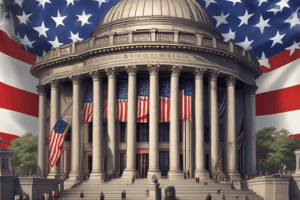Podcast
Questions and Answers
What was a key characteristic of the Federalist Party during its formation?
What was a key characteristic of the Federalist Party during its formation?
- Promoted a strong federal government (correct)
- Supported states' rights
- Opposed commercial economies
- Advocated for agrarian interests
Which act allowed the President to deport non-citizens considered dangerous?
Which act allowed the President to deport non-citizens considered dangerous?
- Naturalization Act
- Alien Act (correct)
- Sedition Act
- Censorship Act
Which event increased Federalist support due to fears of foreign influence?
Which event increased Federalist support due to fears of foreign influence?
- Sedition Act
- XYZ Affair (correct)
- Election of 1800
- Quasi-War
The Election of 1800 is notable for what significant outcome?
The Election of 1800 is notable for what significant outcome?
What was one of John Adams' major contributions to American independence?
What was one of John Adams' major contributions to American independence?
Which political party primarily opposed the Alien and Sedition Acts?
Which political party primarily opposed the Alien and Sedition Acts?
What was John Adams' belief that influenced his foreign policy?
What was John Adams' belief that influenced his foreign policy?
What was a direct result of the XYZ Affair in U.S. politics?
What was a direct result of the XYZ Affair in U.S. politics?
Flashcards are hidden until you start studying
Study Notes
Political Parties Formation
- Emergence of two main political parties:
- Federalists: Led by John Adams and Alexander Hamilton, they supported a strong federal government and commercial economy.
- Democratic-Republicans: Led by Thomas Jefferson and James Madison, they championed states' rights and agrarian interests.
- The rivalry stemmed from differing views on government power, individual liberties, and foreign policy.
- Political debates intensified, leading to polarization and the solidification of party identities.
Alien and Sedition Acts
- Enacted in 1798 by Federalists, aimed at controlling dissent.
- Alien Acts: Allowed the President to deport or imprison non-citizens deemed dangerous.
- Sedition Act: Criminalized false statements against the government, limiting freedom of speech.
- Viewed as overreach; these acts were met with fierce opposition, particularly from Democratic-Republicans.
XYZ Affair
- A diplomatic incident in 1797-1798 between the United States and France.
- American diplomats were approached by French agents (referred to as X, Y, and Z) who demanded bribes for negotiations.
- Stirred public outrage and led to an undeclared naval conflict known as the Quasi-War with France.
- Increased Federalist support due to fears of foreign influence; ultimately influenced the outcome of the Election of 1800.
Election of 1800
- Significant election resulting in a shift of power from Federalists to Democratic-Republicans.
- Thomas Jefferson defeated John Adams in a contentious battle, leading to the first peaceful transfer of power in U.S. history.
- Highlighted deep political divisions and the effectiveness of party mobilization.
- Jefferson's victory marked the decline of Federalist influence in American politics.
John Adams' Legacy
- First Vice President and second President of the United States.
- Known for his strong advocacy for independence and his role in drafting the Declaration of Independence.
- His presidency was marked by significant events like the Alien and Sedition Acts and the XYZ Affair.
- Left a contentious political climate, contributing to the rise of the two-party system.
- Remembered for his commitment to principle over popularity, particularly in foreign policy and civil liberties.
Political Parties Formation
- The Federalist Party, led by John Adams and Alexander Hamilton, advocated for a strong national government and a commercial economy.
- The Democratic-Republican Party, led by Thomas Jefferson and James Madison, emphasized states' rights and agrarian interests.
- The clash between these ideologies shaped early American politics, resulting in the emergence of a two-party system.
- These political debates, fueled by opposing viewpoints on government power, individual liberties, and foreign policy, created intense polarization and solidified party identities.
Alien and Sedition Acts
- In 1798, amidst growing political tensions, the Federalist-controlled Congress passed the Alien and Sedition Acts.
- The Alien Acts empowered the President to detain or expel non-citizens deemed dangerous to the nation.
- The Sedition Act criminalized any false or malicious statements against the government, effectively restricting free speech.
- These acts were met with fierce opposition from Democratic-Republicans who viewed them as an overreach of federal power and a threat to civil liberties.
XYZ Affair
- This diplomatic incident, occurring in 1797-1798, involved American diplomats in negotiations with French agents known as X, Y, and Z.
- The French agents demanded bribes before any negotiations could begin, causing public outrage and igniting anti-French sentiment in the United States.
- This led to an undeclared naval conflict against France known as the Quasi-War.
- The XYZ Affair contributed to the Federalists' rise in popularity as they capitalized on public fear of foreign influence and strengthened their position for the Election of 1800.
Election of 1800
- This election witnessed a significant power shift from the Federalists to the Democratic-Republicans.
- Thomas Jefferson emerged victorious over John Adams, marking the first peaceful transfer of power between political parties in US history.
- The election highlighted the deep political divisions within the country and the effectiveness of party mobilization in mobilizing voters.
- Jefferson's victory marked the decline of Federalist influence and solidified the Democratic-Republican dominance in American politics.
John Adams' Legacy
- John Adams, renowned for his role in drafting the Declaration of Independence and advocating for independence, served as the first Vice President and later the second President of the United States.
- His presidency was marked by significant events like the enactment of the Alien and Sedition Acts and the XYZ Affair, which contributed to rising political tensions and a shift of power.
- Adams left a contentious political climate and ultimately contributed to the solidification of the two-party system in America.
- He is remembered for his commitment to principle over popular opinion, particularly in matters related to foreign policy and civil liberties.
Studying That Suits You
Use AI to generate personalized quizzes and flashcards to suit your learning preferences.




